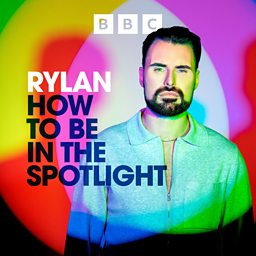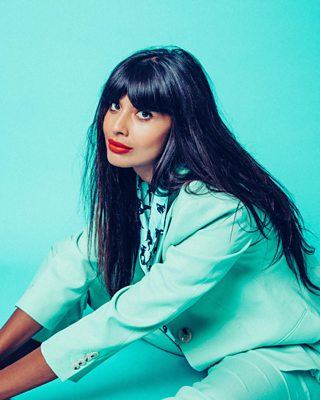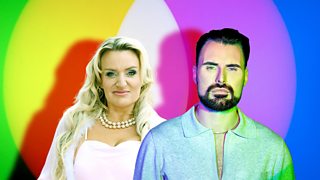Jameela Jamil - Eight things we learned when she spoke to Rylan about How to Be in the Spotlight
Jameela Jamil started her career as a television presenter on Channel 4. Since then, she’s become a radio DJ, writer, Hollywood actress, and activist.
On this episode of Rylan: How To Be In The Spotlight she talks about her complicated relationship with fame, the happy accidents, and why she’ll never stop speaking up for others, even if it gets her into trouble.
Here are eight things we learned…

1. Going to the pub led to accidental fame
Asked if she planned to be famous, Jamil says, “God no… I wanted to be a doctor.” Aged 23, she was working as an English teacher when she was approached in a London pub. “[A man] said there was an open call to replace Alexa Chung on [00s youth show) T4… He said, ‘You should be on TV.’ I said, ‘I would never be on TV. People on TV are so vacuous’… Then he said it was £1,000 a day. I was an English teacher who made that in a month, if I was lucky. So I said, ‘Sorry, what’s the email?’”

I half-felt like the whole thing was a prank... I felt like I was on The Truman Show"Jameela explains what it felt like to be thrown into the world of live television
2. She treats her career like crashing a wedding
A matter of weeks after that pub encounter Jamil was presenting live television. “I half-felt like the whole thing was a prank,” she says. “I felt like I was on The Truman Show… My philosophy in this industry is to treat it like I’ve crashed a wedding. Just get what you can, snog who you can, then [walk away] when you get thrown out.” She even kept her English teaching job for eight months, in case the T4 job ended, “but then it started to become distracting and they didn’t want to talk about anything except what Dappy smells like.”
3. She doesn’t know how to be cool
While she loved the T4 job, Jamil “had difficulty with who they wanted me to be. They wanted me to be cool and superior… I’ve never been cool or felt superior. And there was an element of superiority, like ‘We’re cooler than you and smarter than you.’ I tried to emulate that because I was 23 and I’ve always been a bit of a chameleon where I naturally acclimatise… to whoever I’m around. I’ve had to learn to stop doing that. I tried my best to be sort of haughty and a bit sarcastic, but it just felt so wrong.”
4. Cruel press coverage drove her to fight back
After T4, Jamil became a successful DJ on Radio 1. It was at this time that she experienced how viciously women in the public eye can be treated. “I was on [steroids] for pneumonia and asthma,” she says. “I gained three stone and someone photographed me leaving Radio 1… In that same week I’d made history as the first woman to host The Chart Show solo in 60 years… Rather than celebrate a woman’s achievement, [the press] just made fun of me for gaining three dress sizes.”
Jamil had dealt with anorexia throughout her life and was furious that the press wanted to perpetuate an image that her weight determined her happiness. “I was so horrified because I used to read those weight-loss stories as a kid and believe them.” So she decided to fight back. “That was the beginning of me going, ‘I’m not going to be polite in interviews. I’m not going to talk about my haircare routine. I’m going to talk about this all the time.’ I ended up speaking about [body image] in Parliament.”
5. Acting, like TV presenting, was accidental
In 2016, Jamil moved to Los Angeles where she “just wanted to be a DJ and a writer”. Then she auditioned for a sitcom, The Good Place, and won the role of Tahani. “LA was supposed to be a gap year, then I got a job as an actress and it was a seven year contract.”

I think we need more imperfect women who come back and dust themselves off and try again. If I could be a role model for anything, I think I’m a role model for that.”Jameela is happy to be a role model for screwing up
She felt no pressure to live a celebrity life in LA. “I never got sucked into that. I’m not a nightlife girl. I don’t drink. I don’t smoke. I don’t do drugs. I never have. So there wasn’t a lot of room for me to fall into chaos. And people just [don’t care] who you are. They see celebrities all the time.”
6. She has some regrets about things she’s said
Jamil’s approach to talking about issues that matter to her – from abortion to mental health – has got her into trouble in the past, particularly on social media. “I hugely regret the way that I’ve spoken,” she says. “I’ve really, really worked on my delivery and my tone and my empathy for people.” She’s had online disagreements with public figures and now approaches those in a different way. “It’s the people I most disagree with that I most need to engage with. By being rude and speaking in an immature, callous or disgusting way… why on earth would they take me seriously? Why would they want to engage with me?”
Although she’s altered her approach, she doesn’t regret using her platform to speak up. “It feels like a betrayal to my 12-year-old self to not tell the truth. I think I’d be letting her down if I let this [stuff] slide and didn’t say anything. I do this for her.”
7. She’s a “feminist in progress”
Jamil wants to talk about difficult topics but she doesn’t want anyone to consider her an authority. “I’ve always called myself a feminist in progress,” she says. “I’m just always learning and updating with everyone else.” She wants to be part of a dialogue, not a lecturer. “You can choose whether or not to engage with me, then do the research for yourself. I’m never saying to anyone ‘Believe meeee!’, I’m inviting you to look a little deeper into this conversation.”
8. She’s happy to be a role model for screwing up
Jamil happily holds her hands up to making some mistakes. If anything, she thinks that’s her strength. “If I feel proud of anything… that I’ve done with my platform it’s that I am representation for [screwing] up,” she laughs. “I think we need that. We’ve got a lot of perfect women. I think we need more imperfect women who come back and dust themselves off and try again. If I could be a role model for anything, I think I’m a role model for that.”





